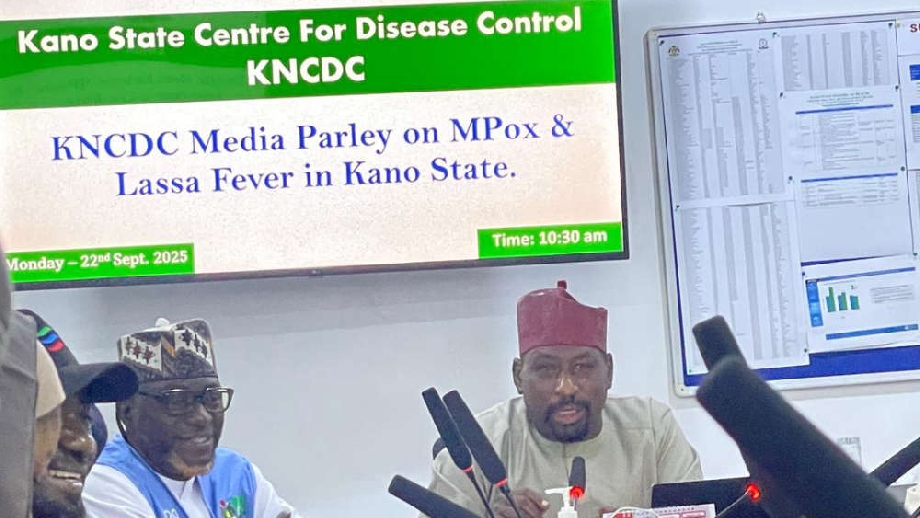
The Kano State government has reported two cases of Mpox this year, but assured residents that both patients have been treated and discharged.
The Director General of the Kano State Centre for Disease Control (KNCDC), Prof. Muhammad Adamu Abbas, confirmed this during a media parley in Kano, convened to raise awareness on disease surveillance and response.
He disclosed that the first case occurred in January in Kano Municipal, while the most recent was in August in Ungogo Local Government Area.
“The most recent case is a 14-year-old boy,” Prof. Abbas explained. “We traced his contacts from his community and the two hospitals he visited, collected their samples, and thankfully, all turned out negative.”
He said the cases had been fully managed, and the patients discharged after recovery, but the state is not letting down its guard.
According to him, Kano recently received an advisory from the Nigeria Centre for Disease Control and Prevention (NCDC), urging heightened vigilance against possible outbreaks of Mpox and other viral diseases.
Heightened Vigilance in Kano
The KNCDC boss stressed that proactive measures remain vital to protecting residents. He explained that Kano, as a commercial hub with a heavy movement of people in and out of the city, faces unique risks of disease transmission.
“Kano is the commercial nerve centre of the country, where the influx and outflux of people is almost a minute-by-minute activity,” he noted.
“Even though we do not share international borders directly, we are connected to states that do, and this places us at risk. We feel vigilance is highly needed, and we must alert our people to the importance of diseases such as Mpox and Lassa.”
Prof. Abbas said public enlightenment is central to curbing the spread of infectious diseases. He called on the media to continue amplifying health communication across communities.
“The media has been our partner, even before the establishment of the KNCDC. Now that the centre has been fully signed into law, our first major engagement is with the media, so that we can work together on surveillance and response.”
Symptoms and Risk Groups
Mpox, previously known as monkeypox, is a viral disease with symptoms that often resemble smallpox, though it is typically less severe.
Prof. Abbas listed fever, headache, muscle pain, backache, swollen lymph nodes, and skin rashes as some of the most common signs. The infection often spreads through close contact with an infected person, animal, or contaminated material.
“People at higher risk include those with multiple sex partners, men who have sex with men, health workers, and anyone who comes into contact with an infected person,” the DG explained.
He warned residents to promptly report suspected symptoms at the nearest health facility or isolate themselves if infected.
The KNCDC has also strengthened treatment and containment capacity. Prof. Abbas revealed that the state has an Isolation Centre at Yar Gaya and can also use designated secondary health facilities to isolate patients when needed.
Plans for Motor Parks and Community Engagement
As part of wider surveillance, Prof. Abbas disclosed that KNCDC is exploring collaboration with major motor parks in Kano.
According to him, the partnership would ensure suspicious cases are quickly reported to health authorities, given that transport hubs are major points of human interaction.
He reiterated that curbing infectious disease outbreaks requires collective effort from government agencies, communities, and individuals alike.
Rabies: A Parallel Threat
Beyond Mpox, experts at the media parley also raised alarm over rabies, which remains a significant public health concern in Kano.
Dr Idris Kyauta, Director of One Health at KNCDC, says statistics rank Kano as the second state in Nigeria with the highest burden of rabies. “Cases are reported daily,” he stressed.
Rabies, caused by a virus transmitted through bites or scratches from infected animals such as dogs, cats, or bats, is nearly always fatal once symptoms appear.
Dr Kyauta explained that the most effective prevention is annual vaccination of pets.
“The common symptom of rabies is a change in the animal’s behaviour. Unfortunately, dog ownership in Kano has been marred by irresponsibility.
Many dog owners fail to vaccinate their pets, which increases the risk of transmission,” he lamented.
In 2023, a USAID report estimated that rabies kills about 55,000 people annually in Nigeria, with rabid dogs accounting for 94 per cent of confirmed human infections. Kano alone recorded at least 100 rabies cases every two months in 2023, underscoring the scale of the problem.
WHO’s Call for Prevention
Also speaking at the briefing, Dr Mukhtar Ali Kabir, the One Health Focal Person for the World Health Organisation (WHO), urged residents to take preventive action against both Mpox and rabies.
He advised residents to report immediately to health facilities if they develop symptoms, and to avoid contact with the blood or body fluids of infected individuals.
“Frequent hand washing with soap and water, or the use of sanitizer, is essential in preventing the spread of these diseases,” he added.
Dr. Kabir encouraged residents to call the KNCDC emergency line — 07077974504 — to report suspicious cases for prompt response.
Strengthening Surveillance for the Future
Health experts say that while Kano has managed its recent Mpox cases successfully, the state’s long-term safety depends on sustained surveillance and proactive public health measures.
However, the public health message remains simple: know the symptoms, take precautions, and report cases early. For residents, that vigilance could mean the difference between a contained outbreak and a wider health crisis.


